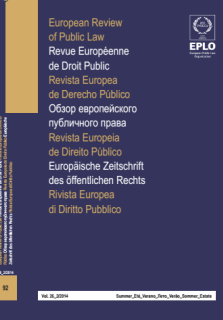
EUROZONE CRISIS AND SOCIAL RIGHTS PROTECTION
IN THE SOUTH EUROPEAN JURISPRUDENCE
CHRISTINA M. AKRIVOPOULOU
Adjunct Lecturer, Democritus University of Thrace
The ongoing Eurozone systemic economic crisis started in 2009 has radically altered the South European jurisprudence concerning social rights protection. As it is illustrated in selected cases from Portugal, Greece and Italy, a shift from asserting and realizing social rights to defending their minimum protection has taken place. This shift in social rights protection in the South European jurisprudence is illustrated and analyzed from three separate yet interconnected points of view: a. its legal justification and the tools that are evoked regarding social rights protection (e.g. principle of equality), b. its agenda setting and balancing between national interest and European politics and c. the invisible barriers that have to be respected concerning separation of powers and the role of the judiciary during an economic, political and human rights crisis. In the end, it is underlined that the current economic crisis more and more will be forcing the South European jurisprudence to re-capture social rights from a moral rather than economic human rights point of view.
La crise économique systémique qui existe dans la zone euro dès 2009 a extrêmement modifié la jurisprudence de l'Europe du Sud portant sur la protection des droits sociaux. Comme il est bien illustré dans des cas pris par le Portugal, la Grèce et l'Italie, un changement de l'assertion et de la mise en œuvre des droits sociaux en la défense de leur moindre protection a eu lieu. Ce changement concernant la protection des droits sociaux dans la jurisprudence de l'Europe du Sud est illustré et analysé des trois points de vue distincts mais interdépendants: a. sa justification légale et les outils nécessaires pour la protection des droits sociaux (e.g. le principe d'égalité), b. son agenda d'établissement et d'équilibre entre l'intérêt national et la politique européenne et c. les barrières invisibles qui doivent être respectées en ce qui concerne la séparation des pouvoirs et le rôle de la justice pendant une crise économique et politique ainsi que pendant une crise des droits de l'homme. Finalement, il est souligné que la crise économique actuelle obligera de plus en plus la jurisprudence de l'Europe du Sud à rétablir les droits sociaux du point de vue des droits de l'homme morale plutôt qu'économique.





















